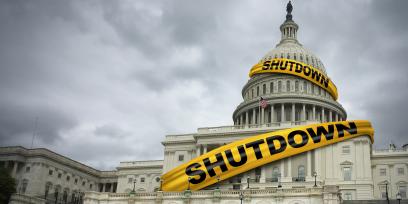We are days away from a completely unwarranted shutdown of the federal government on Oct. 1 that could cause 1.8 million workers―including hundreds of AFT members―to stop receiving their paychecks. Among all federal workers, that would mean $5 billion in lost wages weekly until Congress funds the government.
The Republican-controlled House, which has primary responsibility for federal funding under the Constitution, has not yet completed its work on several major appropriations bills, including education. As negotiations over government funding come to a head, MAGA Republicans continue to demand cuts to essential programs that working families rely on, including Social Security, housing, education and climate. And thousands of federal employees, including our members who teach in Defense Department schools, would not get paid until the impasse is resolved.
House Republicans, who have been too busy fighting among themselves to complete this work over the summer, now have a plan to pass as many as half a dozen fiscal 2024 funding bills over the next week. None of them is likely to avert a shutdown by the time the current fiscal year ends on Saturday night.
And a temporary measure to keep the government running is not in sight. There is a potential workaround, however. It’s called a “discharge petition,” a maneuver by which a majority of the House could bypass the speaker of the House and force a vote on keeping the government open. It’s a complex procedure, and there’s virtually no way to get it done before Oct. 1.
Overseas teachers worry about students
Members of the AFT’s Overseas Federation of Teachers, which represents teachers who work in Department of Defense schools in Bahrain, Italy, Spain and Turkey, are considered “mission critical” and would have to work without pay through the crisis. They almost certainly would have to wait until funds are appropriated and then receive backpay.
OFT President Linda Hogan says she is especially concerned about young military parents who don’t earn a lot to begin with and who would have to go without pay during the shutdown. As always with such a disruption, it is the children of these enlisted people who would suffer.
Public employees sit tight in Illinois
Half a world away, public employees in Illinois who work under federal programs but are paid by the state government are waiting to see whether their paychecks will be interrupted, says Matthew Emigholz, president of the Illinois Federation of Public Employees.
In particular, the IFPE is checking on the status of meat and poultry inspectors, whose pay may be forward-funded—which means that the programs are funded a year in advance and thus should be able to continue through a shutdown. The IFPE represents about 1,500 working people in the public sector, with more than 60 professional job titles.
Another blow to Native Americans
When people think about federal employees in the AFT, they usually think of the Federation of Indian Service Employees, an affiliate of AFT Public Employees whose members serve Native American communities through four federal agencies. These agencies—primarily the Bureau of Indian Affairs and the Bureau of Indian Education—conduct most of the public services offered to Indigenous people throughout the United States.
This means that FISE, which represents more than 5,000 federal workers in more than 20 states, accounts not only for public services but for a significant proportion of the income coming into Native communities through federal BIA and BIE employees. Disruptions like the COVID-19 pandemic or federal shutdowns severely harm Native communities.
“Here we go again,” says FISE President Sue Parton. Of the four agencies where our union represents employees, only education employees in the BIE would be spared. That’s because those preK-12 and postsecondary programs are forward-funded.
However, in the BIA and two smaller agencies, members holding jobs deemed “essential” would have to work or be furloughed without pay for the duration of the shutdown. That includes those who must drive for hours, or travel up and down steep canyons via helicopter, to reach their workplaces.
Although it’s still unclear which units or positions would be considered essential, Parton says, law enforcement employees would surely be among them: BIA police officers, corrections officers and support personnel.
Making staff shortages worse
Public sector agencies have always had to compete with the private sector on job stability and security—meaning good benefits and stable employment—especially when they can’t compete on salary. But with the specter of federal shutdowns looming more often than ever in recent decades, public service advocates fear that staff shortages in vital public sector jobs will grow even worse. And that, in turn, could lead to even more costly and less reliable privatization.
The last federal shutdown five years ago dragged on for more than a month over the winter of 2018 and 2019, imposing financial hardships on AFT members.
“Let this be the last time any elected official uses our federal public workers as political pawns,” AFT President Randi Weingarten said at the time. “Our government services and the people who provide them are critically important. Any attempt to hold them hostage over political ideology is wrong and dangerous.”
And yet here we are again.
[Annette Licitra]

